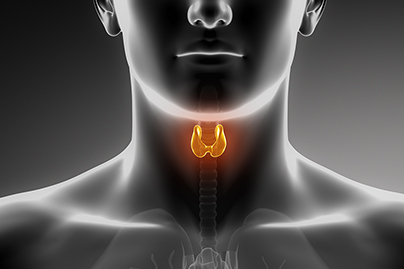Hyperthyroidism refers to an overactive thyroid gland that is producing too much thyroid hormone, which regulates the body’s metabolism.

Hyperthyroidism is diagnosed by having increased levels of the thyroid hormones produced by the thyroid gland, causing a decreased level of thyroid stimulating hormone (TSH). The prevalence rate of hyperthyroidism is approximately 0.5%.1 In subclinical hyperthyroidism, patients have normal thyroid levels but an abnormal TSH. They may not experience any symptoms and may progress to hyperthyroidism in the future. A major cause of hyperthyroidism is autoimmunity, with the body forming auto-antibodies that stimulate the thyroid gland to release excessive amounts of thyroid hormone. A Nutritarian diet, therefore, can play a large role in the prevention and treatment of hyperthyroidism.
Symptoms of hyperthyroidism include
Causes and risk factors for hyperthyroidism include
The development of Grave’s disease often follows a stressful event.1 Stress reduction and meditation is helpful in the treatment of hyperthyroidism.
ONLINE: All members of DrFuhrman.com can search the Ask the Doctor archives for discussions on this topic. Platinum and Diamond members can connect with Dr. Fuhrman by posting questions in the forum. Not a member? Join now.
IN PERSON or ONLINE: Book a consultation with a specialist at Longevity Rx in San Diego, California, run by Joel Fuhrman, MD and Cara Fuhrman, ND. Using nutritional protocols, cutting-edge screening tools, advanced imaging, and innovative treatments for pain and injuries, they'll create a personalized action plan to help you prevent and recover from illness, and achieve your optimal weight. Book online at Longevity Rx or call +1 (858) 367-3558
EVENTS: Join Dr. Fuhrman for an online boot camp, detox or other event. During these immersive online events, you’ll attend zoom lectures, follow a special meal plan, and have access to a special, live Q&A session with Dr. Fuhrman. Learn more about events.
The following are sample questions from the Ask the Doctor Community Platinum and higher members can post their health questions directly to Dr. Fuhrman. (All members can browse questions and answers.)
I have seen conflicting research on whether people with hyperthyroidism should take or avoid iodine. I have primarily read that foods and supplements with iodine should be avoided, but then, I recently saw an article claiming taking it would actually heal or improve the condition.
What is your understanding and recommendation on this? I follow a Nutritarian diet about 90% of the time and have hyperthyroidism, Grave’s disease, and thyroid eye disease.
Hyperthyroidism is an autoimmune disease. That means the immune system attacks the thyroid gland. Iodine deficiency is rare. Both too little and too much iodine is harmful, but that has nothing to do with your thyroid disease. You should follow my high green diet, which is explained more in the November 2004 newsletter. It is the total program and the high amount of nutrient-rich produce that make this program so beneficial for hyperthyroidism.
Is hyperthyroidism always an autoimmune disorder?
Should someone with a thyroid disorder be tested for celiac disease?
Is it better to avoid gluten altogether (even without an intolerance)?
Grave‘s disease is the most common cause of hyperthyroidism and is an autoimmune disease. One can also get hyperthyroidism from multinodular goiter, benign adenomas (growths that produce thyroid hormone on their own), and thyroid cancers. Various forms of thyroiditis (inflammation of the thyroid) can produce temporary hyperthyroidism. Since the autoimmune kind is most common (but you should follow up with your endocrinologist to determine the cause of your hyperthyroidism), following the autoimmune protocol in the November 2004 newsletter would be beneficial, and yes, it involves avoiding gluten.
I just had lab tests done which showed a TSH of 0.01. I definitely have the symptoms that go along with a thyroid problem, fatigue and weakness being the greatest complaints. How should I proceed? How much can diet do for this problem? Free T3 and free T4 were not done. Do they need to be?
Make an appointment with your doctor. You don‘t want to wait, as the symptoms related to hyperthyroidism can be debilitating. Hyperthyroidism can cause serious problems, including heart arrhythmias.
You should have more tests, including the other thyroid tests.
I have treated patients with the early phases of autoimmune hyperthyroidism and seen complete recoveries, enabling them to avoid thyroid radiation and surgery.
In other words, besides measuring the disease activity and getting more tests done, you should begin the strictest version of the autoimmune protocol (November 2004 newsletter) immediately.